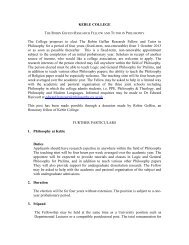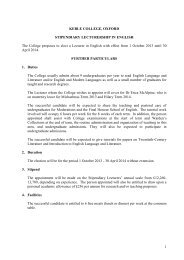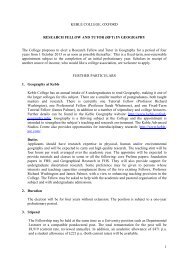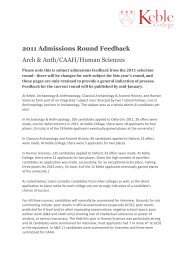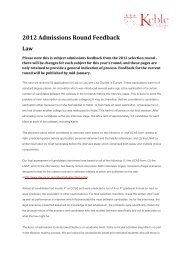The Record 2009 - Keble College - University of Oxford
The Record 2009 - Keble College - University of Oxford
The Record 2009 - Keble College - University of Oxford
You also want an ePaper? Increase the reach of your titles
YUMPU automatically turns print PDFs into web optimized ePapers that Google loves.
<strong>Keble</strong> <strong>College</strong>: <strong>The</strong> <strong>Record</strong> <strong>2009</strong><br />
knowledge <strong>of</strong> Greek and Latin, we can combine the pieces <strong>of</strong><br />
information <strong>of</strong>fered by such ancient ‘historians <strong>of</strong> philosophy’<br />
and reconstruct, to some extent at least, the views and sayings<br />
<strong>of</strong> the ancient philosophers that would otherwise be doomed to<br />
complete obscurity.<br />
It is this third option that my ongoing research work focuses<br />
on: as a British Academy Postdoctoral Fellow at <strong>Keble</strong> my<br />
‘mission’ is to study Plutarch as historian <strong>of</strong> philosophy with a<br />
view to evaluating his understanding and presentation <strong>of</strong> past<br />
philosophical theories in his works.<br />
Plutarch <strong>of</strong> Chaeroneia was a scholar, Platonist philosopher<br />
and, perhaps most eminently, a biographer <strong>of</strong> the 1 st –2 nd century<br />
ad. However, he is not the sort <strong>of</strong> figure that immediately<br />
springs to mind when one thinks about ‘history <strong>of</strong> ancient<br />
(Greek) philosophy’. More celebrated for his biographical work,<br />
the famous Lives which have inspired great minds, such as Jean-<br />
Jacques Rousseau and Shakespeare, Plutarch is less known for<br />
his philosophical work; this is preserved in a collection <strong>of</strong> essays<br />
in 15 volumes named Moralia, but is usually taken to be only<br />
‘popular philosophy’ (the negative connotations <strong>of</strong> the term are<br />
obvious!). Often dubbed a ‘Platonist’ exegete, his acumen as a<br />
philosopher has generally not been considered very highly; he,<br />
therefore, only marginally figures in modern histories <strong>of</strong> ancient<br />
philosophy as a philosopher in his own right. His wide learning<br />
may be appreciated, but not so his philosophical originality<br />
and spirit. At the same time, however, Plutarch is one <strong>of</strong> the<br />
few 1 st –2 nd century ad philosophers whose writings survive to<br />
a great extent and contain an enormous amount <strong>of</strong> precious<br />
information about the philosophy <strong>of</strong> his past and the theories <strong>of</strong><br />
ancient philosophers whose works are now lost. Hence Plutarch<br />
frequently figures among our list <strong>of</strong> secondary sources for<br />
ancient philosophical theories which are only fragmentarily<br />
preserved today. Nonetheless, Plutarch has still suffered ‘bad<br />
press’: scholars have <strong>of</strong>ten come to the conclusion that he<br />
probably misinterpreted the point <strong>of</strong> the philosophical theory<br />
he reports in his essays, either because <strong>of</strong> lack <strong>of</strong> philosophical<br />
acumen or out <strong>of</strong> bias.<br />
Now I dare say there is a bit <strong>of</strong> a paradox lurking here: on the<br />
one hand, we use Plutarch’s philosophical works as a source,<br />
and on the other hand, we do not, by and large, pay all that<br />
much attention to the way in which Plutarch dealt with and<br />
interpreted the philosophical theses <strong>of</strong> the past <strong>of</strong> which he is<br />
a source; and even if we do, our judgement about Plutarch’s<br />
interpretation tends to be not a very flattering one. Yet, in order<br />
18



